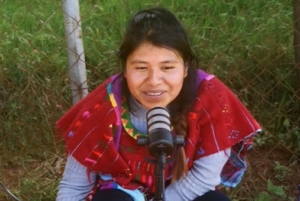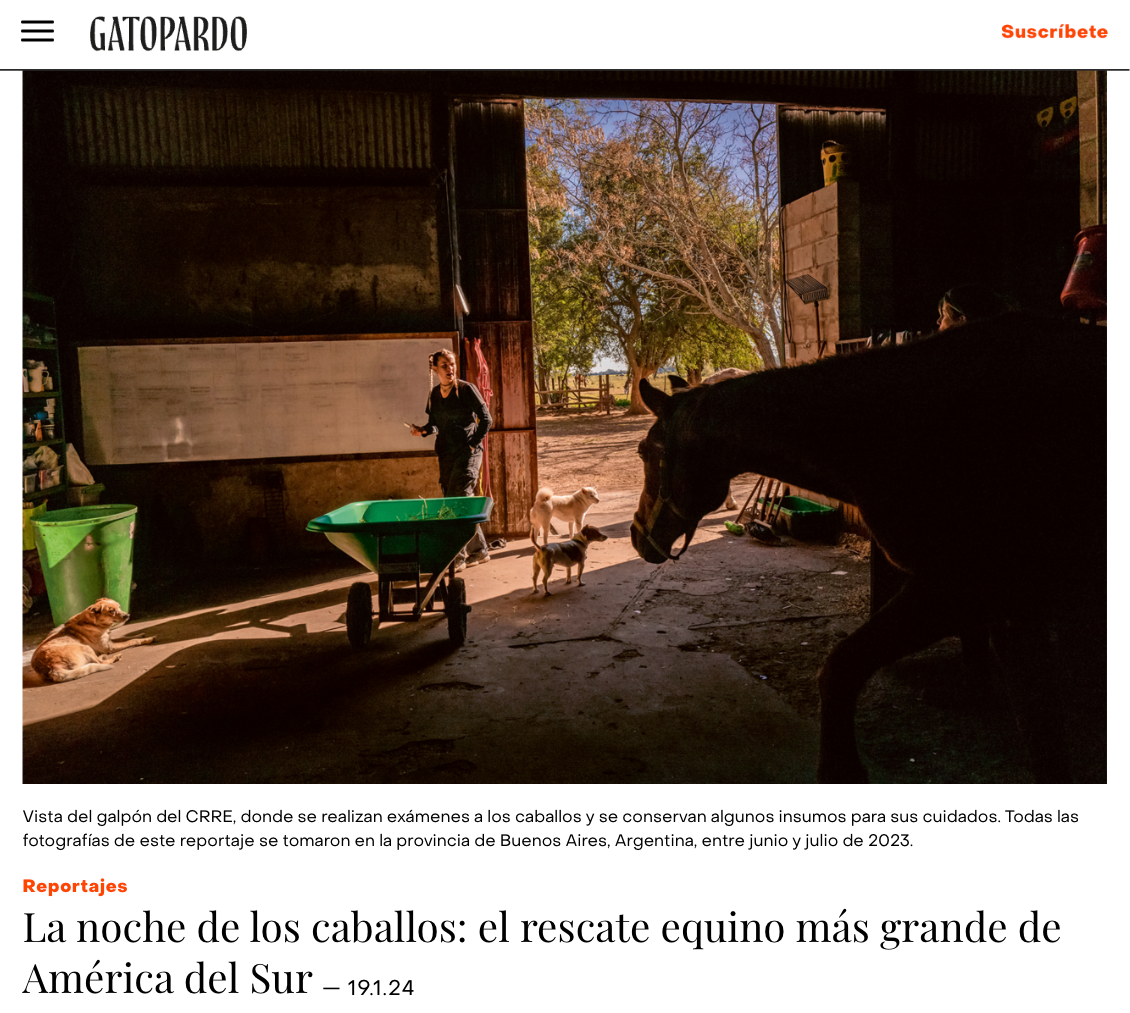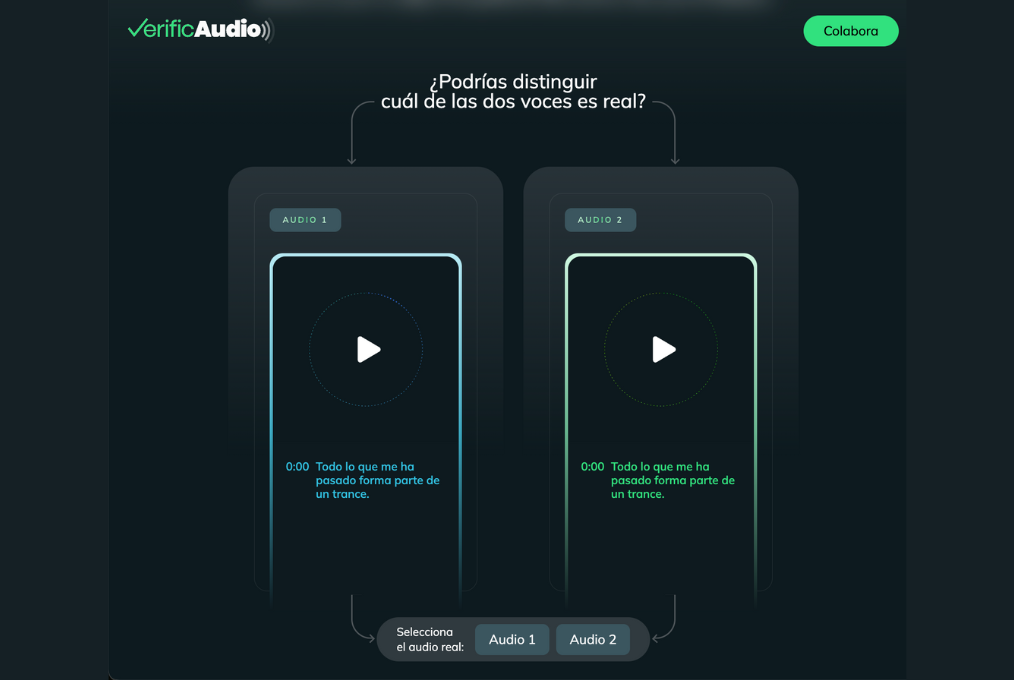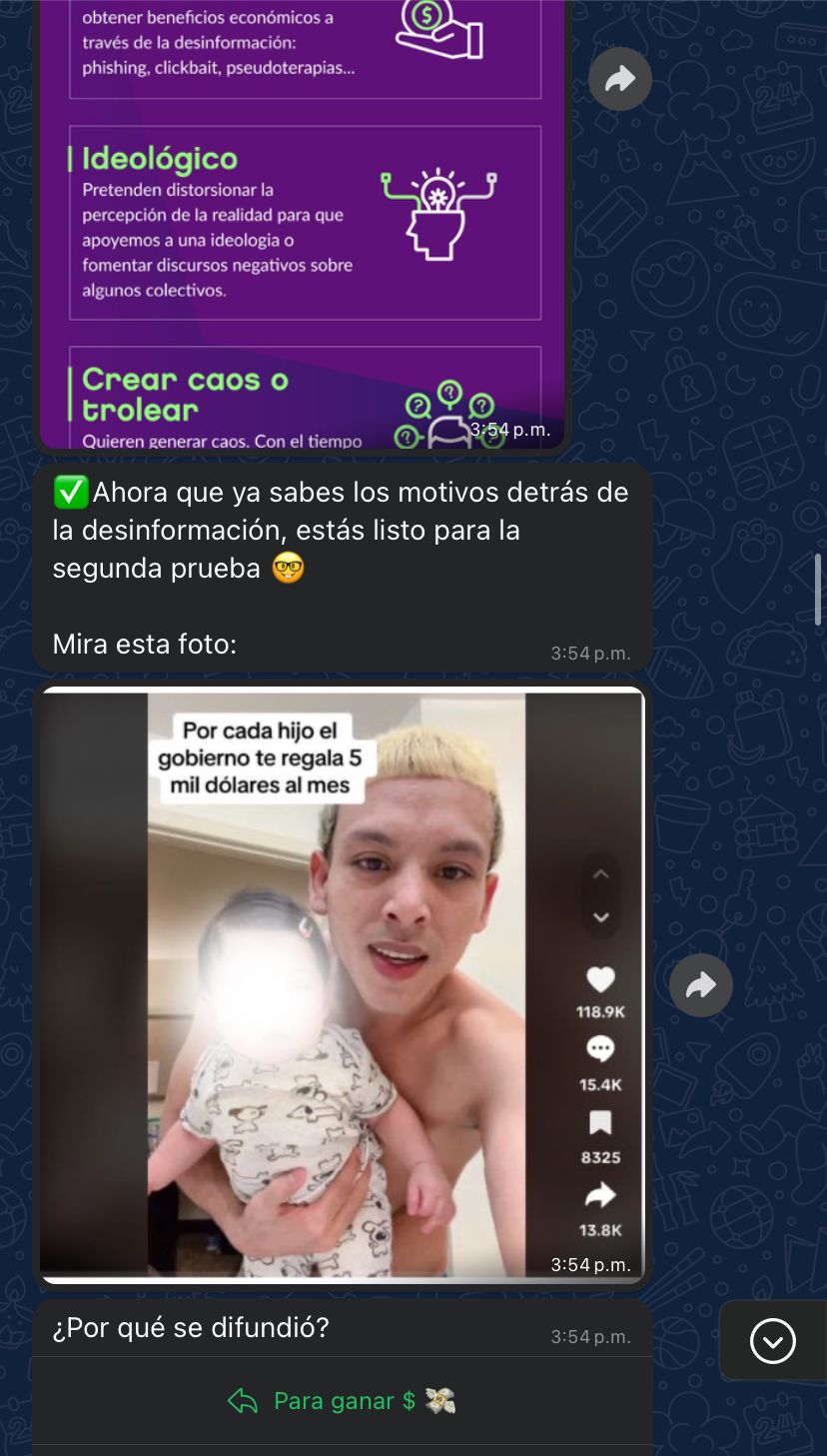This past year in Latin America saw news projects that pushed the boundaries of technology, format, and collaboration. They ranged from AI-driven tools to bypass censorship or combat disinformation to cross-border collaborative projects revealing complex networks of corruption and organized crime.
Realities such as life under authoritarian regimes, migratory patterns, and controversial electoral processes prevalent in the region inspired reporting projects that not only resulted in innovation but also made significant impacts on their countries and communities.
Here are 10 innovative projects from digital and traditional media in 2024 that stood out for their creativity and ability to tackle pressing issues in the Latin American context.
Amid the censorship within the political crisis following this year’s presidential elections in Venezuela, two alliances of media outlets and journalists created “Operation Retweet,” a newscast hosted by AI-generated avatars. The characters—a male and a female avatar—report news based on information researched and verified by anonymous human journalists who remain unidentified to avoid retaliation in the oppressive environment faced by the press after the electoral process.
![]()
Title: “Operación Retuit” (“Operation Retweet” in English)
Authors: 14 media outlets part of the Venezuela Vota and #LaHoraDeVenezuela alliances
Publication date: Starting August 14, 2024
Why it’s innovative: It uses AI-generated avatars to bypass censorship and repression by an authoritarian regime
Nayelli López Reyes, a 27-year-old weaver and activist from San Martín Itunyoso, a rural indigenous community in Oaxaca, Mexico, developed a podcast series that became a powerful example of resistance and denunciation of violence against women.
“Las mujeres valientes: Guií Chanáa” (“Brave Women” in English) is a six-episode audio production narrated in both Spanish and the Triqui indigenous language. It stemmed from López Reyes’ participation in Spotify’s Sound Up, a training initiative for women looking to tell their stories through podcasts.
The production won the Gabo Award in the audio category this year for offering “an authentic and raw perspective on sexual violence against indigenous women” and for its “impeccable and minimalist” sound design, according to the jury.

Title: "Las mujeres valientes: Guií Chanáa" (“Brave Women” in English)
Author: Nayelli López Reyes
Media outlets: Spotify (Mexico)
Publication date: April-May 2023
Why it’s innovative: It includes indigenous women's voice testimonies and narration in an indigenous language rarely recorded in digital audio.
A collaboration between seven outlets from four countries, led by Noticias Telemundo and the Latin American Center for Investigative Journalism (CLIP), produced “Trucks, Traps for Migrants,” a multimedia investigation unveiling unprecedented details about how smugglers use truck containers to transport migrants across Mexican roads to the U.S.
Following a seven-month investigation involving official documents, press reports, and testimonies collected on social media, the team created a database documenting the transport of nearly 19,000 migrants – 3,200 of them minors – in containers between 2018 and 2023.
The team, consisting of reporters, animators, and illustrators, transformed the content into multiple formats, including a 40-minute documentary featuring victim testimonies and key actors, an interactive map, and a downloadable database. The project earned the Excellence in Collaboration and Partnerships Award at this year’s Online Journalism Awards.

Title: "Tráileres, trampa para migrantes" (Trucks, Traps for Migrants in English)
Authors: Ronny Rojas, Albinson Linares, and collaborators from Noticias Telemundo, CLIP, and other outlets
Media outlets: Noticias Telemundo, CLIP, Bellingcat, and others
Publication date: April 30, 2024
Why it’s innovative: It combines data journalism, crowdsourcing, open-source intelligence, geolocation, and local reporting to collaboratively investigate a transnational phenomenon
The digital native outlet El Surti, based in Paraguay, found an innovative way to narrate the story of a woman imprisoned for drug trafficking through a chatbot. Launched this August, the project uses AI to tell, through an interactive conversation, the social, economic and gender-related circumstances that lead many Paraguayan women to become involved in drug trafficking.
While more media outlets in Latin America are experimenting with chatbots to answer reader questions or combat misinformation, "Eva" stands out as one of the few examples of using this type of AI to tell a story that fosters empathy for a specific issue.
The project was one of 14 proposals selected for the 5th edition of the Fund for Investigations and New Narratives on Drugs (FINND) by the Gabo Foundation. It was developed over four months by journalists, conversational designers, and UX writers, based on interviews conducted between 2022 and 2024 with women accused of drug trafficking.

Title: “Eva”
Authors: Juliana Quintana, Sebastián Hacher, and Axel Marazzi
Media outlet: El Surti (Paraguay)
Publication date: August 27, 2024
Why it’s innovative: For using a chatbot to tell a story while protecting the identities of individuals involved in sensitive issues and raising awareness about a critical problem
Argentine journalist Diego Fernández Romeral published in January “La noche de los caballos: el rescate equino más grande de América del Sur” (English: The Night of the Horses: South America’s Largest Equine Rescue), a long-form investigative report uncovering a web of corruption and organized crime within Argentina’s horse meat industry.
The piece, featured in Gatopardo magazine, made history by winning two categories at this year’s Gabo Awards: Text and Photography, the latter led by Argentine photographer Anita Pouchard Serra.
Award jurors praised Fernández Romeral for his "unique perspective, in-depth investigation, and exceptional prose," highlighting his decision to tackle a subject largely overlooked by Argentine media.
Pouchard Serra’s photographs were lauded for capturing the resilience of the rescued horses and forging an emotional connection with readers, according to the jury.

Authors: Diego Fernández Romeral and Anita Pouchard Serra
Media outlet: Gatopardo magazine (Mexico)
Publication date: January 19, 2024
Why it’s innovative: For employing a novel narrative approach that captured multiple facets of a problem previously unexplored in depth
The media outlets Salud con Lupa (Peru), The Examination (United States), El Clip, ColombiaCheck (Colombia), Agência Pública (Brazil), and ChequeaBolivia (Bolivia) joined forces to produce “Redes de Nicotina. Nuevos productos, viejas tácticas” (English: (“Nicotine Networks: New Products, Old Tactics”), a cross-border collaborative project exposing how the tobacco industry has quietly spent millions to revive old strategies for promoting vaping products across borders.
This project comprises a series of reports developed by over 20 journalists. Through public records research, data journalism, expert and victim testimonies, fact-checking, and analysis of social media and marketing strategies, the team uncovered practices that harm young people's health.
The special report earned second place in the Javier Valdez Latin American Investigative Journalism Award from the Institute of Press and Society (IPYS) and Transparency International for Latin America and the Caribbean (TILAC). It was also a finalist for the 2024 Award for Journalistic Excellence by the Inter-American Press Association (IAPA).

Title: “Redes de Nicotina. Nuevos productos, viejas tácticas” (English: “Nicotine Networks: New Products, Old Tactics”)
Authors: Fabiola Torres, Jason Martínez, Renzo Gómez, Alicia Tovar Tirado, Alexandra Shimabukuro, María Pérez, Mago Torres, Fernanda Aguirre, Ana María Saavedra, Sharom D. Mejía, Alexander Campos Sandoval, José Luis Peñarredonda, Enid Patricia López, Lucas Illanes, Avaguazu Escóbar, Zaida Choque, Juan Carlos Uribe, Laura Scofield, Rafael Oliveira, and Bianca Feifel
Media Outlets: Salud con Lupa (Peru), The Examination (United States), El Clip, ColombiaCheck (Colombia), Agência Pública (Brazil), and ChequeaBolivia (Bolivia)
Publication date: November 2023 - January 2024, with additional material throughout 2024
Why it’s innovative: For conducting collaborative, cross-border, and multidisciplinary work focused on a social and public health issue that had not been deeply explored in the region
Rising concerns over the spread of AI-manipulated audio in Spanish-speaking countries led PRISA, a media group based in Spain, to implement VerificAudio—a tool designed to combat disinformation in audio content for its radio stations in Spain and parts of Latin America.
The tool uses two Natural Language Processing (NLP) models, trained with both real and cloned audio, to identify and analyze suspicious audio and detect deep fakes.
While the tool’s creators emphasized that VerificAudio is not intended to replace journalists’ fact-checking efforts, it was developed to aid informed decision-making in newsrooms, particularly in countries with elections this year, such as Mexico. VerificAudio also allows the public to submit suspicious audio for analysis.

Title: VerificAudio
Media outlets: PRISA Group radio stations (Spain and Latin America)
Publication date: March 2024
Why it’s innovative: For applying AI technology to detect synthetic audio content in newsrooms, providing greater reliability in fact-checking
The Organized Crime and Corruption Reporting Project (OCCRP) and the Latin American Center for Investigative Journalism (CLIP) spearheaded NarcoFiles: El nuevo orden criminal (English: NarcoFiles: The New Criminal Order), a collaborative, cross-border investigative journalism project uncovering how organized crime groups evolve, expand, and operate in the modern world.
More than 70 journalists from 40 media outlets across 23 countries joined forces for the project, which began with the leak of over 5 TB of data from Colombia’s Attorney General's Office, claimed by the hacktivist organization Guacamaya in October 2022.
Despite the scope of the investigation and numerous logistical and security challenges, the team produced over 50 reports revealing new strategies and structures in global drug trafficking. The work earned the 2024 Inter American Press Association (IAPA) Award for Excellence in Journalism in the In-Depth Journalism category.

Title: "NarcoFiles: The New Criminal Order"
Editors: Sally Mairs, Alexander Dziadosz, Jared Ferrie, and Miranda Patrucic (OCCRP)
Media outlets: Agencia Ocote (Guatemala), Aristegui Noticias (Mexico), Armando.Info (Venezuela), Berlingske (Denmark), BIRD (Bulgaria), Centro Latinoamericano de Investigación Periodística (Colombia), Cerosetenta / 070 (Colombia), CNN en Español (United States), Con Criterio (Guatemala), ContracorrienteHN (Honduras), Cuestión Pública (Colombia), De Tijd (Belgium), Der Standard (Austria), Die Dunkelkammer (Austria), El Universal (Mexico), Expresso (Portugal), Frontstory.pl (Poland), Het Parool (Netherlands), Infolibre (Spain), InSight Crime (United States), Investigace.cz (Czech Republic), IrpiMedia (Italy), Knack (Belgium), La Prensa (Panama), Mexicanos Contra la Corrupción (Mexico), Miami Herald (United States), Mongabay Latam (United States), Narcodiario (Spain), No Ficción (Guatemala), Ojoconmipisto (Guatemala), OjoPúblico (Peru), Paper Trail Media (Germany), piauí (Brazil), Plan V (Ecuador), Plaza Pública (Guatemala), Profil (Austria), Quinto Elemento Lab (Mexico), Siena (Lithuania), SVT (Sweden), Univision (United States), UOL (Brazil), Verdad Abierta (Colombia), Vorágine (Colombia), ZDF (Germany)
Publication Dates: 2023–2024
Why it’s innovative: Described by its creators as “the largest investigation of its kind originating in Latin America,” the project combined international collaboration, advanced techniques for analyzing leaked data, fieldwork, and diverse documentary sources
"A ellos no les vamos a abrir…" (loosely, in English: “We Will Not Open The Door For Them”) is a multimedia investigative report resulting from a collaboration between the digital investigative journalism outlets La Verdad (Ciudad Juárez, Mexico) and El Paso Matters (El Paso, United States), alongside the collaborative investigative journalism support agency Lighthouse Reports (Netherlands).
This partnership brought together diverse expertise and resources to deeply investigate the events of March 27, 2023, at a migrant detention center on the Mexico–United States border, where 40 migrants lost their lives in a fire.
The multimedia report uncovered abuses and omissions by officials from Mexico’s National Institute of Migration. Leveraging the partners' experience in migration issues along the border and employing innovative forensic reconstruction techniques, the investigation debunked official narratives about the fire, demonstrating that the 40 deaths were preventable.
The report earned an honorable mention at the 2024 Javier Valdez Latin American Investigative Journalism Award.

Title: "A ellos no les vamos a abrir…” (loosely, in English: “We Will Not Open The Door For Them”)
Authors: Blanca Carmona, Gabriela Minjares, Rocío Gallegos, Cindy Ramírez, and Mónica C. Camacho
Media outlets: La Verdad (Mexico), Lighthouse Reports (Netherlands), and El Paso Matters (United States)
Publication date: March 19, 2024
Why it’s innovative: For integrating interdisciplinary collaboration, advanced forensic reconstruction technology, and a human-rights-focused approach to expose negligence and abuse of authority
Misinformation in Spanish within the United States requires a cultural approach that goes beyond merely translating the fact-checking efforts of English-speaking media.
This was the premise when the fact-checking outlet Factchequeado created #FactChallenge, an interactive course on WhatsApp designed to help Latino and Spanish-speaking communities in the U.S. learn basic media literacy concepts to avoid falling victim to misinformation during this year's presidential campaigns.
The tool, developed with the support of PEN America, consists of a series of lessons delivered via WhatsApp messages. Each lesson includes text, video, audio, and interactive activities that guide participants through identifying false information and learning how to verify content on their own.
One of the most innovative aspects of this initiative is its accessibility. Unlike traditional media literacy courses, which can sometimes require advanced technology or tools, #FactChallenge was designed specifically for a platform as widely used and accessible as WhatsApp.

Title: “#FactChallenge”
Authors: Factchequeado, supported by PEN America
Media organization: Factchequeado (United States)
Date of publication: March–November 2024
Why it’s innovative: For creating an accessible, culturally relevant, and interactive tool to fight misinformation among Spanish-speaking communities in the U.S.